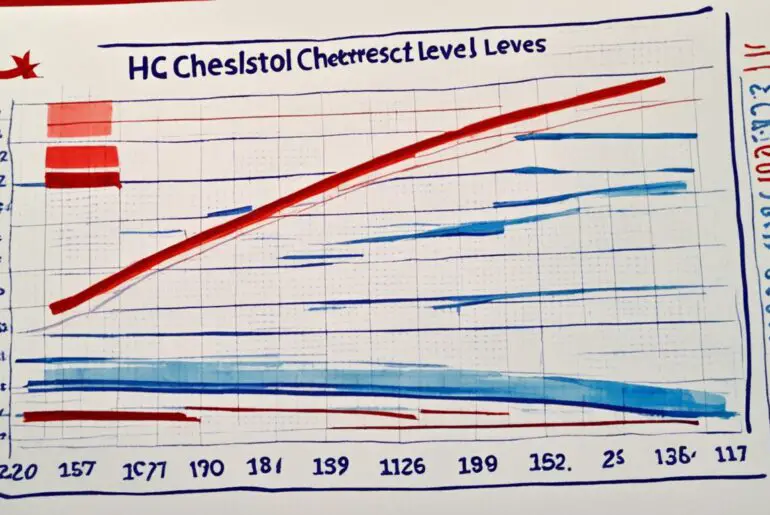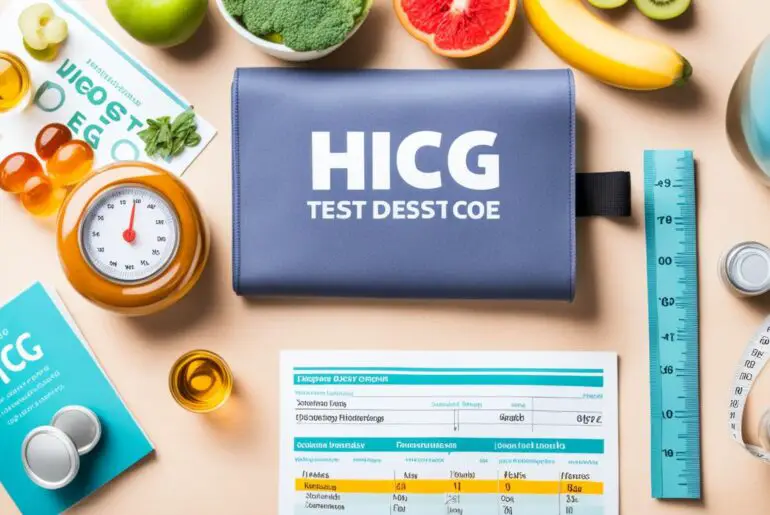Are you considering the HCG diet for weight loss? If so, you may have heard claims that it can help you shed pounds quickly while keeping hunger at bay. But have you ever wondered about the impact of this diet on your mood? Can the HCG diet actually lead to mood swings? Let’s explore the truth behind HCG diet mood swings management and discover the best strategies to maintain emotional well-being on this controversial weight loss journey.
When it comes to weight loss, it’s important to consider the potential side effects and risks associated with any diet plan. This is especially true for the HCG diet, as it involves severe calorie restriction and the use of the HCG hormone, which is primarily used for fertility treatment and not approved by the FDA for weight loss purposes.
In this article, we’ll delve into the science behind the HCG diet and its alleged benefits, discuss the potential side effects of the diet, and explore safer alternatives for achieving your weight loss goals. We’ll also provide practical strategies for coping with mood swings and maintaining emotional well-being while on the HCG diet, as prioritizing your mental health is just as important as your physical health throughout your weight loss journey.
So, if you’re ready to unravel the truth behind HCG diet mood swings and discover effective management techniques, read on. Your emotional well-being and successful weight loss journey depend on it.
Key Takeaways:
- The HCG diet is not approved by the FDA for weight loss and has not been proven to be effective.
- Severe calorie restriction and the use of HCG can lead to potential side effects and risks.
- There are safer alternatives for weight loss, such as a balanced diet and regular exercise.
- Coping with mood swings on the HCG diet requires managing stress, practicing self-care, and maintaining a support system.
- Seeking professional guidance and prioritizing emotional well-being are essential for a successful weight loss journey.
The Science Behind HCG and Weight Loss
HCG, or human chorionic gonadotropin, is a hormone produced during pregnancy. While it has been theorized that HCG can selectively metabolize calories from fat stores and suppress appetite, there is limited scientific evidence to support these claims. The use of HCG for weight loss is not approved by the FDA and is not recommended as a safe or effective method for long-term weight management.
Many proponents of the HCG diet claim that the hormone can promote rapid weight loss by targeting stubborn fat and preserving muscle mass. However, studies assessing the efficacy of HCG in weight loss have yielded inconclusive results. The limited research available suggests that any weight loss experienced during the HCG diet is likely due to the severe calorie restriction rather than the hormone itself.
“While some individuals may report successful weight loss on the HCG diet, it is essential to recognize that these results may be attributed to the extremely low-calorie intake rather than the HCG hormone.”
The FDA has not approved the use of HCG for weight loss, and it is important to consult with a healthcare provider before considering any drastic dietary changes or hormonal supplementation. They can provide personalized guidance and help you explore safe, evidence-based options for weight management.
To achieve long-term, sustainable weight loss, it is recommended to focus on adopting healthy lifestyle habits that include a balanced diet, regular physical activity, and adequate rest. These strategies have been proven to be safe and effective in promoting weight loss and overall well-being.
| HCG Diet | Weight Loss |
|---|---|
| HCG is a hormone used in the HCG diet | Weight loss results are attributed to severe calorie restriction |
| No FDA approval for weight loss | Safe weight loss is achieved through lifestyle changes |
| Limited scientific evidence for its effectiveness | Scientifically proven methods provide long-term results |
Potential Side Effects of HCG Diet

When considering the HCG diet, it is important to be aware of the potential side effects that may arise. While some individuals may experience no adverse effects, others have reported various symptoms. These side effects can vary in terms of severity and duration. It is advised to discuss these potential risks with a healthcare provider before embarking on the HCG diet.
Mood Swings and Emotional Well-being
One common side effect of the HCG diet is mood swings. These fluctuations in emotions can range from irritability and restlessness to feelings of depression. It is essential to prioritize emotional well-being during any weight loss journey, including the HCG diet. Practicing stress management techniques, engaging in self-care activities, and seeking support from loved ones or a therapist can help manage and mitigate mood swings.
Fatigue and Restlessness
Another reported side effect of the HCG diet is fatigue. Some individuals may experience a lack of energy and feel tired throughout the day. Additionally, restlessness can be commonly experienced, making it difficult to relax or sustain a sense of calm. Adequate rest and sleep, along with implementing stress reduction techniques, can help combat these symptoms.
Fluid Buildup and Gynecomastia
In certain cases, fluid buildup and swelling of the breasts, known as gynecomastia, have been reported as side effects of the HCG diet. It is crucial to monitor any changes in the body and consult a healthcare provider if these symptoms arise. They can provide appropriate guidance and intervention to address these concerns.
Potential Blood Clot Risks
Another important consideration is the potential risk of blood clot formation and subsequent blockage of blood vessels, known as thromboembolism, with the use of HCG. This risk underscores the importance of medical supervision and monitoring during the HCG diet. Healthcare professionals can assess individual health factors and recommend necessary precautions to minimize risk.
Understanding the potential side effects of the HCG diet is crucial before embarking on this weight loss journey. Discussing these risks with a healthcare provider can help individuals make informed decisions about whether the HCG diet is the right approach for their specific circumstances.
Safer Alternatives for Weight Loss
If weight loss is your goal, there are safer and more sustainable ways to achieve it. A balanced diet and regular exercise are key components for achieving healthy weight loss.
A healthy diet consists of whole foods, lean proteins, fruits, vegetables, and whole grains. These nutrient-rich foods provide essential vitamins, minerals, and fiber to support your overall health and well-being.
Regular exercise is crucial for burning calories, boosting metabolism, and improving cardiovascular health. Incorporating activities such as cardio, strength training, and flexibility exercises can help you achieve your weight loss goals while building lean muscle mass.
Consulting with a healthcare provider or a registered dietitian can provide personalized guidance and support for your weight loss journey. They can help you create a customized plan that takes into account your individual needs, preferences, and any underlying health conditions.
“A balanced diet and regular exercise are the foundation for safe and effective weight loss.”
Benefits of Safe Weight Loss Strategies
Choosing safe weight loss strategies offers numerous benefits:
- Promotes long-term weight management
- Supports overall health and well-being
- Enhances energy levels and stamina
- Improves mood and mental clarity
- Reduces the risk of chronic diseases such as heart disease and diabetes
Comparison: Safe Weight Loss vs. Fad Diets
| Safe Weight Loss Strategies | Fad Diets |
|---|---|
| Promote balanced eating habits | Restrictive and often eliminate food groups |
| Encourage regular physical activity | Do not prioritize exercise |
| Focus on long-term results | Promote short-term weight loss |
| Sustainable and maintainable lifestyle | Unsustainable and difficult to maintain |
Choosing safe weight loss strategies, such as a healthy diet and regular exercise, ensures that you are making lasting changes to your lifestyle. These changes not only help you reach your weight loss goals but also support your overall health and well-being.
Coping with Mood Swings on the HCG Diet

Managing mood swings and maintaining emotional balance while on the HCG diet is essential for a successful weight loss journey. It is common to experience fluctuations in emotions as your body adjusts to the calorie restrictions and hormonal changes associated with the diet. Fortunately, there are strategies that can help you cope with these mood swings and manage your emotions effectively.
Practicing Stress Management Techniques
One effective way to cope with mood swings is to practice stress management techniques. Engaging in activities such as mindfulness, deep breathing exercises, and physical exercise can help reduce stress levels and promote emotional well-being. By incorporating these techniques into your daily routine, you can better manage your emotions and maintain a sense of balance throughout the HCG diet.
Prioritizing Self-Care
Self-care plays a crucial role in maintaining emotional balance. It is important to prioritize activities that help you relax and rejuvenate. This can include engaging in hobbies you enjoy, spending quality time with loved ones, or simply taking time for yourself. Getting enough rest, practicing good sleep hygiene, and nourishing your body with nutritious food can also contribute to your overall well-being and help manage mood swings.
Building a Support System
Having a support system is vital during the HCG diet. Surrounding yourself with understanding and supportive individuals can provide emotional support and encouragement. It is beneficial to have someone to talk to about your challenges, concerns, and achievements throughout the diet. Sharing your experiences with others who are going through the same journey can help you feel understood and motivated to stay on track.
Practicing Emotional Awareness
Developing emotional awareness can help you identify triggers for mood swings and implement appropriate coping strategies. Paying attention to your emotions, thoughts, and physical sensations can provide valuable insights into your emotional well-being. Incorporating practices such as journaling or therapy sessions can deepen your understanding of your emotions and support emotional balance throughout the HCG diet.
Strategies for Emotional Well-being on the HCG Diet
Emotional well-being is essential when embarking on a weight loss journey, including the HCG diet. Managing mood swings and prioritizing self-care are key strategies for maintaining emotional balance throughout the process.
Engage in Activities that Bring Joy and Relaxation
When following the HCG diet, it’s crucial to engage in activities that bring you joy and relaxation. Whether it’s practicing a hobby, spending time in nature, or enjoying a favorite pastime, these activities can help reduce stress and improve overall well-being. Find what brings you happiness and make time for it.
Practice Self-Compassion and Self-Care
Being kind to yourself is vital during the HCG diet. Practice self-compassion by acknowledging that ups and downs are part of the journey and that it’s okay to stumble sometimes. Take care of your physical and mental health by prioritizing self-care activities like getting enough sleep, eating nutritious meals, and practicing relaxation techniques.
Seek Support from Loved Ones or a Therapist
Having a strong support system can make a significant difference in your emotional well-being. Reach out to loved ones who can provide encouragement, understanding, and accountability. Additionally, consider seeking support from a therapist or counselor who can provide professional guidance and help you navigate the challenges of the weight loss journey.
Set Realistic Expectations for Weight Loss Progress
It’s essential to set realistic expectations for your weight loss progress while on the HCG diet. Remember that every individual’s journey is unique, and weight loss may vary from person to person. Setting realistic goals and acknowledging small milestones can help you stay motivated and prevent frustration or self-doubt.
Cultivate Emotional Well-being Alongside Physical Health
While focusing on losing weight, it’s crucial to remember that emotional well-being is equally important. Recognize that your mental and emotional health go hand in hand with your physical health. Prioritize practices that nourish both aspects of your well-being to achieve lasting balance and success in your weight loss journey.
Seeking Professional Guidance for HCG Diet
Before embarking on the HCG diet or any significant weight loss journey, it is highly recommended to consult with a healthcare provider. They can provide personalized guidance, assess your individual health needs and risks, and help you create a safe and effective weight loss plan. A healthcare provider can also monitor your progress and provide support throughout your weight loss journey.
When considering the HCG diet or any drastic weight loss method, seeking professional guidance is essential for success. A healthcare provider can offer expert advice based on your unique health profile and assist you in designing a safe and sustainable weight loss plan.
Consulting a healthcare provider allows you to address any underlying health conditions that may affect your weight loss journey. They can assess your medical history, evaluate potential risks, and guide you towards healthy choices that align with your individual needs and goals.
HCG injections or drops should never be used without professional supervision. Healthcare providers can monitor your progress, evaluate any possible side effects, and make adjustments to ensure that the HCG diet is safe for you.
Remember, your weight loss journey should prioritize your overall well-being. Seeking professional guidance ensures that you are supported with evidence-based strategies that consider your health, both in the short and long term.
| Benefits of Consulting a Healthcare Provider | Why It’s Important |
|---|---|
| Personalized guidance | Assess your specific health needs and risks |
| Safety | Monitor potential side effects and adjust your plan accordingly |
| Support and accountability | Ensure you have the necessary resources and guidance throughout your weight loss journey |
| Medical supervision | Evaluate any underlying health conditions that may affect your weight loss and tailor your plan accordingly |
| Long-term success | Receive guidance for maintaining your weight loss and transitioning into a sustainable lifestyle |
Incorporating Healthy Habits for Long-Term Success

Long-term weight management and success rely on incorporating healthy habits into your lifestyle. By making sustainable lifestyle changes, you can achieve your goals and maintain a healthy weight in the long run.
1. Maintain a balanced, nutrient-rich diet: Focus on consuming a variety of whole foods, including fruits, vegetables, lean proteins, and whole grains. Avoid highly processed foods and excessive intake of sugar and unhealthy fats.
2. Stay physically active through regular exercise: Engage in activities that you enjoy, such as walking, swimming, or cycling. Aim for at least 150 minutes of moderate-intensity aerobic activity per week and incorporate strength training exercises to build muscle.
3. Manage stress: Implement stress management techniques such as deep breathing, meditation, or yoga to reduce stress levels. Chronic stress can contribute to weight gain and hinder your weight management efforts.
4. Get enough sleep: Aim for 7-9 hours of quality sleep per night. Prioritize a consistent sleep schedule and create a sleep-friendly environment to support optimal rest and recovery.
5. Practice mindful eating: Slow down and savor your meals. Pay attention to your body’s hunger and fullness cues, and choose nourishing foods that support your health and well-being.
“Incorporating healthy habits is not just about losing weight, it’s about creating a sustainable lifestyle that promotes overall well-being.”
Benefits of Healthy Habits for Long-Term Weight Management
The adoption of healthy habits offers numerous benefits beyond just weight management:
- Improved overall health and reduced risk of chronic diseases
- Enhanced energy levels and increased productivity
- Boosted mood and mental well-being
- Greater self-confidence and body positivity
- Increased longevity and improved quality of life
By incorporating these healthy habits into your daily routine, you can create a sustainable lifestyle that supports your long-term weight management goals.
Key Habits for Long-Term Weight Management
| Habits | Benefits |
|---|---|
| Balance diet | Provides essential nutrients for overall health Supports weight management |
| Regular exercise | Improves cardiovascular health Increases muscle strength and endurance Promotes weight loss and weight maintenance |
| Stress management | Reduces the risk of stress-related weight gain Improves mental well-being |
| Adequate sleep | Supports proper metabolism and hormone regulation Reduces cravings and appetite |
| Mindful eating | Enhances enjoyment and satisfaction with meals Prevents overeating and promotes portion control |
By following these key habits, you can create a strong foundation for long-term weight management and live a healthier, more fulfilling life.
Managing Weight and Emotional Well-being Beyond the HCG Diet

After completing the HCG diet, it is crucial to transition into a balanced and sustainable approach to weight management. This includes not only focusing on physical health but also prioritizing emotional well-being. To successfully navigate the post-diet transition period, consider the following strategies:
- Continue Healthy Eating Habits: Maintain a nutritious diet that includes a variety of fruits, vegetables, lean proteins, and whole grains. By incorporating these foods into your daily meals, you can support ongoing weight management and overall well-being.
- Stay Active: Regular physical activity is essential for maintaining a healthy weight and improving overall fitness. Engage in activities you enjoy, such as walking, swimming, or cycling, and aim for at least 150 minutes of moderate-intensity exercise per week.
- Prioritize Emotional Well-being: Recognize the importance of emotional health in your post-diet journey. Practice self-care activities that promote relaxation and stress reduction, such as meditation, yoga, or spending time in nature.
- Build a Support System: Surround yourself with individuals who understand and support your weight management goals. Seek encouragement from friends, family, or support groups who can provide motivation, accountability, and understanding during challenging times.
- Seek Professional Guidance: Consult with a healthcare provider or registered dietitian to create a personalized plan for post-diet weight management. They can offer expert guidance, monitor your progress, and provide valuable insights and recommendations tailored to your specific needs.
Remember, successfully managing weight and emotional well-being goes beyond the confines of any specific diet. Embrace a holistic approach to health, focusing on a balanced lifestyle that supports long-term well-being. By making sustainable changes, seeking support, and prioritizing your own needs, you can achieve lasting success in your weight management journey.
Celebrating Achievements and Setting New Goals

Celebrating your weight loss achievements, no matter how small, is important for maintaining motivation and staying focused on your journey. Take time to acknowledge and appreciate your progress. Whether you’ve lost a few pounds or reached a major milestone, recognize the effort and dedication you’ve put into improving your health. Celebrating your achievements not only boosts your confidence but also reinforces your commitment to your goals.
Setting new goals is an essential part of any health journey. Once you’ve achieved your initial objectives, it’s time to aim for new targets and continue striving for self-improvement. This can include setting specific weight loss goals, such as reaching a certain weight or fitting into a particular clothing size. Alternatively, you can focus on enhancing your fitness level by aiming to run a certain distance or lift heavier weights.
It’s important to set realistic and achievable goals that align with your unique situation and abilities. This allows you to maintain a sense of motivation and progress without feeling overwhelmed. Setting new goals provides direction and purpose, giving you something to work towards and keeping you engaged in your health journey.
Remember, it’s not just about the destination but also the journey itself. Enjoy the process of setting new goals, planning strategies to achieve them, and monitoring your progress along the way. Treat yourself with kindness and patience, understanding that setbacks and challenges are normal. By celebrating achievements and setting new goals, you maintain the motivation necessary to continue making positive changes in your life.
Quotes:
“Celebrate your small victories, for they are the stepping stones to your greater achievements.” – Joyce Meyer
“Setting goals is the first step in turning the invisible into the visible.” – Tony Robbins
Personal Goals:
- Lose an additional 5 pounds within the next month.
- Complete a 5K run by the end of the year.
- Incorporate strength training into my fitness routine at least three times a week.
- Practice mindfulness meditation for 10 minutes every day.
Professional Guidance:
To help you set realistic goals and maintain motivation, consider seeking professional guidance from a healthcare provider or a registered dietitian. They can provide personalized advice, create a customized plan, and offer ongoing support throughout your health journey.
The Importance of Self-Care on the HCG Diet

Practicing self-care is vital while on the HCG diet. Taking care of your mental and emotional well-being is just as important as your physical health. By prioritizing self-care, you can support your overall well-being and contribute to a positive mindset for a successful weight loss journey.
- Take time for relaxation: Engaging in activities that promote relaxation, such as reading, taking a bath, or listening to calming music, can help reduce stress and promote a sense of well-being.
- Engage in hobbies or activities you enjoy: Pursuing hobbies or activities that bring you joy and fulfillment can help boost your mood and provide a healthy outlet for stress.
- Practice self-compassion: Be kind to yourself throughout your weight loss journey. Acknowledge and celebrate your progress, and avoid harsh self-criticism. Treat yourself with the same compassion and understanding you would extend to a loved one.
- Prioritize your mental and emotional health: Pay attention to your mental and emotional needs. This can include seeking support from friends, family, or a therapist, journaling, or practicing mindfulness and meditation.
Remember, taking care of yourself is not selfish. It is essential for maintaining balance and well-being. By incorporating self-care practices into your routine, you can prioritize your mental and emotional health while on the HCG diet. When you prioritize self-care, you set yourself up for long-term success not just in weight loss but also in overall well-being.
Conclusion
After careful evaluation, it is clear that the HCG diet is not a safe or effective method for weight loss. Severe calorie restriction and the use of HCG can pose significant risks and potential side effects. Instead, I recommend prioritizing safe and sustainable weight loss strategies, such as adopting a balanced diet and engaging in regular exercise.
It is crucial to consult with healthcare professionals for guidance and support throughout your weight loss journey. They can provide personalized advice and help create a plan that is tailored to your individual needs and goals. Managing mood swings and maintaining emotional well-being are vital components of any successful weight loss journey, so don’t forget to prioritize self-care and seek support from loved ones or professionals.
It’s important to remember that the path to a healthier lifestyle is not just about the end result. Celebrate your achievements, no matter how small, and continue to set new goals to stay motivated and focused. By incorporating healthy habits and taking care of your mental and emotional well-being, you can achieve long-term success in managing your weight and overall health.
FAQ
Is the HCG diet approved by the FDA?
The use of HCG for weight loss is not approved by the FDA.
Is the HCG diet effective for weight loss?
The effectiveness of the HCG diet for weight loss is not scientifically proven.
What are the potential side effects of the HCG diet?
Common side effects of the HCG diet include fatigue, irritability, restlessness, and depression.
Are there safer alternatives for weight loss?
Safe weight loss strategies include a balanced diet and regular exercise.
How can I cope with mood swings on the HCG diet?
Managing emotions and practicing stress management techniques can help cope with mood swings on the HCG diet.
What are some strategies for emotional well-being on the HCG diet?
Engaging in activities that bring joy, seeking support, and setting realistic expectations can contribute to emotional well-being on the HCG diet.
Should I consult a healthcare provider before starting the HCG diet?
It is highly recommended to consult a healthcare provider before starting the HCG diet.
How can I incorporate healthy habits for long-term weight management?
Incorporating a balanced diet, regular exercise, and stress management can support long-term weight management.
How can I manage weight and emotional well-being after the HCG diet?
Transitioning to a balanced approach, seeking support, and prioritizing emotional well-being can help manage weight and emotional well-being after the HCG diet.
How important is it to celebrate achievements and set new goals?
Celebrating achievements and setting new goals can help maintain motivation and keep focus on the weight loss journey.
What is the importance of self-care on the HCG diet?
Practicing self-care is important for overall well-being and maintaining a positive mindset on the HCG diet.




